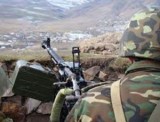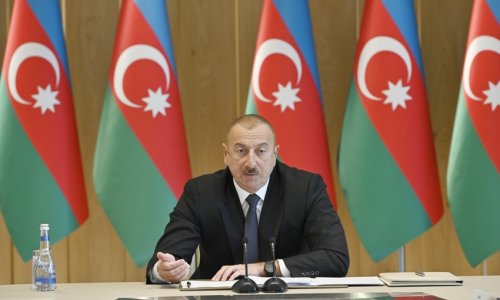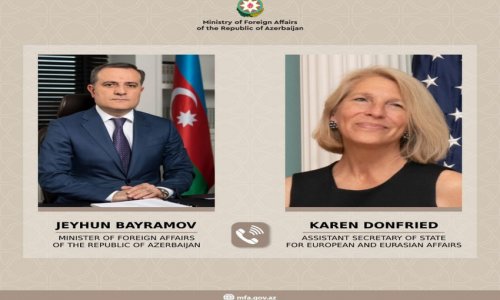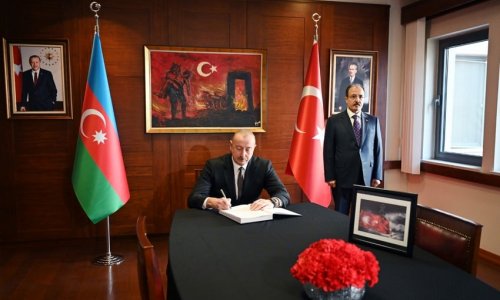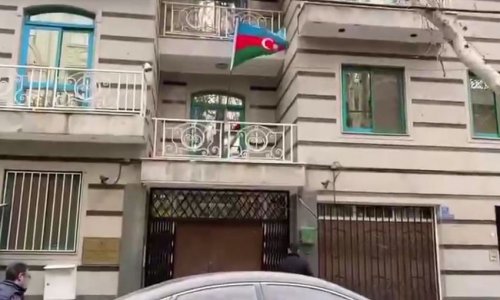Nagorno-Karabakh, which lies inside Azerbaijan but is controlled by ethnic Armenians, has run its own affairs with heavy military and financial backing from Armenia since a separatist war ended in 1994.
But the situation along the tense "contact line" deteriorated in recent weeks, leading to clashes in which dozens were killed that drew international calls for an immediate ceasefire. Both sides also reported civilian casualties. [nL5N17505J]
"Armenia has violated all the norms of international law. We won't abandon our principal position. But at the same time we will observe the ceasefire and after that we will try to solve the conflict peacefully," President Ilham Aliyev said at a security council meeting broadcast by Azeri state TV.
Aliyev also said Azeri troops had achieved a "great victory" in an apparent reference to territorial gains made on Saturday.
Armenian officials, however, said the fighting had not let up and Deputy Defence Minister David Tonoyan said his country was ready to provide "direct military assistance" to Nagorno-Karabakh forces if necessary.
"The statement by the Azerbaijan side is an information trap and does not amount to a unilateral ceasefire," Artsrun Hovhannisyan, spokesman for the Armenian Defence Ministry, said in a post on his Facebook page.
Russian news agencies reported artillery attacks by both sides near the town of Mardakert in the north of Nagorno-Karabakh.
The Azeri Defence Ministry said earlier on Sunday it would "cease retaliatory military actions" against the separatist forces. The previous day it said the Azeri army had "liberated strategic heights and settlements" in the north and east of the region.
The Nagorno-Karabakh military said Baku's statement on a unilateral ceasefire was "disinformation" but that it was ready to discuss a ceasefire proposal from Azerbaijan on the condition both sides returned to their positions held before the clashes erupted.
"The Nagorno-Karabakh armed forces are ready to meet and discuss a ceasefire proposal in the context of restoring former positions," the Nagorno-Karabakh military said.
"UNRESTRAINED FANTASIES".
The conflict over Nagorno-Karabakh, a region home to around 150,000 people on the southern Armenian-Azeri border, broke out in the dying years of Soviet Union. By the time the 1994 ceasefire was brokered, some 30,000 people had been killed in the violence.
Multiple efforts over the years to reach a permanent settlement led by France, Russia and the United states have failed. Baku frequently threatens to take back the mountain region by force.
The Azeri Defence Ministry said its forces had destroyed 10 separatist tanks and killed multiple fighters in overnight clashes.
The Nagorno-Karabakh military rejected the Azeri statements that it had suffered heavy losses as a "display of unrestrained fantasies", saying it had destroyed 14 Azeri tanks and five armoured vehicles in the past 24 hours.
"The enemy is trying to hide its helplessness, carrying out attacks with Grad rocket launchers and 152 millimetre artillery in the direction of the civilian population," the Armenian Defence Ministry said in a statement.
STRATEGIC IMPORTANCE
Crisscrossed with pipelines and sandwiched between the Caspian and Black seas, stability in the southern Caucasus is a major strategic objective for Azerbaijan and other large oil and gas producers in the region.
World top oil producer Russia - which maintains a garrison of troops, jets and attack helicopters in northern Armenia - has been a key mediator in the conflict over Nagorno-Karabakh and moved on Saturday to suppress the renewed violence.
President Vladimir Putin urged the warring sides to immediately observe the ceasefire while Russia's foreign and defence ministers talked by phone with their Armenian and Azeri counterparts.
Azerbaijan's presidential press service said Turkey, the other major power in the region along with Russia, had voiced support for Baku's actions, the RIA news agency reported.
The United Nations has also called on the parties involved to put an immediate end to the fighting and to respect the ceasefire agreement.
"The Secretary General... is particularly concerned by the reported use of heavy weapons and by the large numbers of casualties, including among the civilian population," a U.N. spokesman said in a statement late on Saturday.
(Reuters)
www.ann.az
Follow us !

